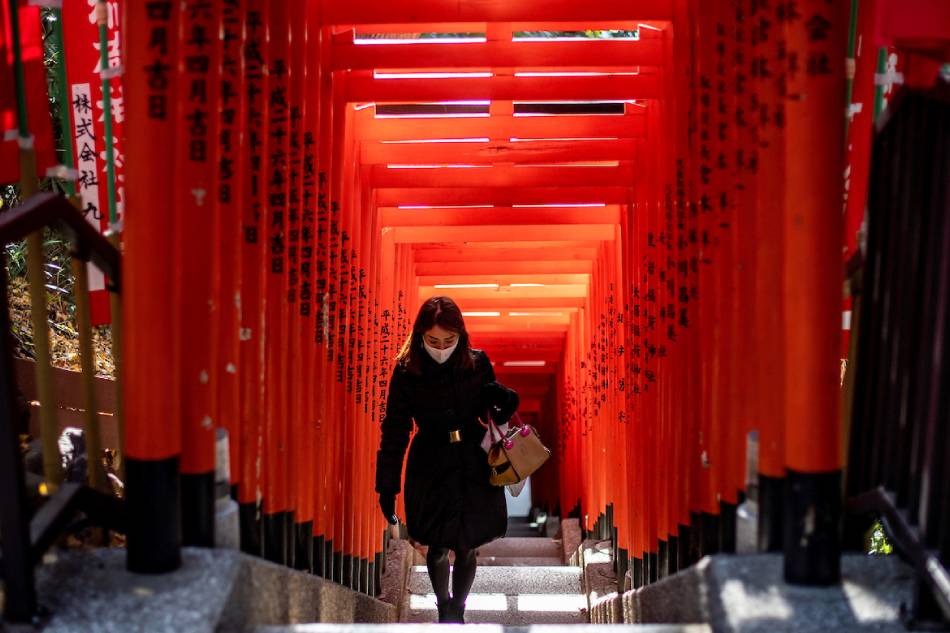Japan to lift COVID nonresident foreigner entry ban for Philippines, 105 nations | ABS-CBN
ADVERTISEMENT

Welcome, Kapamilya! We use cookies to improve your browsing experience. Continuing to use this site means you agree to our use of cookies. Tell me more!
Japan to lift COVID nonresident foreigner entry ban for Philippines, 105 nations
Japan to lift COVID nonresident foreigner entry ban for Philippines, 105 nations
Kyodo News
Published Apr 07, 2022 12:22 PM PHT
TOKYO — Japan will lift its entry ban on nonresident foreign nationals from 106 countries including Britain, India and the United States starting from Friday, the government said, as part of procedures to gradually ease COVID-19 restrictions.
TOKYO — Japan will lift its entry ban on nonresident foreign nationals from 106 countries including Britain, India and the United States starting from Friday, the government said, as part of procedures to gradually ease COVID-19 restrictions.
The policy change, however, will not drastically change Japan's pandemic-induced strict border controls, as it will continue to suspend the validity of visas issued before Dec. 2 except for diplomats, spouses of Japanese nationals and permanent residents, among others.
The policy change, however, will not drastically change Japan's pandemic-induced strict border controls, as it will continue to suspend the validity of visas issued before Dec. 2 except for diplomats, spouses of Japanese nationals and permanent residents, among others.
Visas will not be issued, in principle, unless those seeking to enter Japan fall under "exceptional circumstances," such as visits to those who are seriously ill or for funerals. Foreign tourists remain banned from entering Japan.
Visas will not be issued, in principle, unless those seeking to enter Japan fall under "exceptional circumstances," such as visits to those who are seriously ill or for funerals. Foreign tourists remain banned from entering Japan.
Of the 106 subject to the change, announced by the Foreign Ministry on Wednesday, the list includes Asian countries such as Cambodia, Indonesia, Malaysia, Mongolia, the Philippines and Thailand as well as European countries such as France, Germany, Italy and Spain.
Of the 106 subject to the change, announced by the Foreign Ministry on Wednesday, the list includes Asian countries such as Cambodia, Indonesia, Malaysia, Mongolia, the Philippines and Thailand as well as European countries such as France, Germany, Italy and Spain.
ADVERTISEMENT
Countries no longer subject to the entry ban will also include Qatar, Saudi Arabia and the United Arab Emirates, as well as Latin American and African nations such as Brazil, Chile, Morocco and Tunisia.
Countries no longer subject to the entry ban will also include Qatar, Saudi Arabia and the United Arab Emirates, as well as Latin American and African nations such as Brazil, Chile, Morocco and Tunisia.
The latest move comes in line with Japan's easing on April 1 of its travel warning for the 106 nations because of the pandemic, with Japanese nationals no longer recommended against visiting these areas.
The latest move comes in line with Japan's easing on April 1 of its travel warning for the 106 nations because of the pandemic, with Japanese nationals no longer recommended against visiting these areas.
The ministry lowered its advisory from the second-highest Level 3 on its 4-point scale to Level 2, under which Japanese citizens are asked to refrain from all nonessential overseas travel.
The ministry lowered its advisory from the second-highest Level 3 on its 4-point scale to Level 2, under which Japanese citizens are asked to refrain from all nonessential overseas travel.
Japan effectively imposed an entry ban on nonresident foreign nationals in late November to curb the spread of the highly transmissible omicron variant. Students, academics and business circles have criticized the measure as being too strict.
Japan effectively imposed an entry ban on nonresident foreign nationals in late November to curb the spread of the highly transmissible omicron variant. Students, academics and business circles have criticized the measure as being too strict.
As the infection situation has somewhat eased in recent weeks, Japan has been relaxing its border controls, which Prime Minister Fumio Kishida called the "most stringent" among the Group of Seven nations.
As the infection situation has somewhat eased in recent weeks, Japan has been relaxing its border controls, which Prime Minister Fumio Kishida called the "most stringent" among the Group of Seven nations.
Starting Sunday, Japan will raise the daily cap on overseas arrivals to around 10,000 from the current 7,000.
Starting Sunday, Japan will raise the daily cap on overseas arrivals to around 10,000 from the current 7,000.
RELATED VIDEO
Read More:
ANC
Japan
Tokyo
COVID-19
COVID19
coronavirus
COVID-19 restrictions
entry ban
ban
nonresident foreign nationals
ADVERTISEMENT
ADVERTISEMENT



